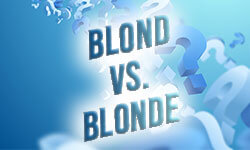
It’s common to encounter words that are easily confused. These are called commonly confused words. One such pair is “blond” and “blonde.” Even though they may seem to have the same meaning and function, there are subtle differences in usage between these two. In academic writing, it is crucial to be clear and precise in effectively communicating your ideas, otherwise the incorrect use of a word can negatively impact the quality of your writing.
Definition of “blond” vs. “blonde”
“Blond” and “blonde” are both adjectives and nouns used in English to describe hair that is yellow or very light brown, or someone who has hair of that color. The word originates from the French word “blond,” which refers to “light brown” and similar hues.
Traditionally, “blond” refers to boys and men, whereas “blonde” typically refers to girls and women. In less common cases, those adjectives can also describe animals, objects, or materials. To some native English speakers, this grammatical gendering might be an unfamiliar concept, but it is common in many other languages around the world.
Blond
Blonde
…is an adjective and a noun describing the yellow or very light-brown color of someone or something. It’s traditionally used for girls and women.
The key to distinguishing between “blond” and “blonde” is to remember the origin of it. In France, “blond” is the masculine form and “blonde” is the feminine form. However, this rule is not always agreed upon, according to the Garner’s Modern American Usage Style Guide. It advises against using “blonde” due to the potential for sexist implications.
The fact that the form “blonde” is now preferred in all senses in British English can be even more confusing, whereas, Americans tend to be more flexible with the usage of “blond/blonde.”
Summarized, maintaining clarity and consistency is crucial in writing academic papers such as dissertations, essays, or theses.
Using the word “blond“
The word “blond” is used as an adjective and as a noun. How it is applied in a sentence, and what the word means, will be explained below.
“Blond“ as an adjective
The adjective “blond” refers to hair or fur that is light in color. It can also be used for inanimate objects. Usually, when describing a masculine or non-gendered noun, you can use the masculine form.
“Blond” as a noun
The noun “blond” refers to someone with hair that is light in color. It can be used for masculine or non-gendered nouns as well.
Tip for using “blond“ correctly
Synonyms for “blond” avoid repetition and redundancy and improve your language overall. Using them makes your writing more diverse and adds nuance to a language. Some of these examples focus more on the specific shade of color.
| Synonyms | Examples |
| Fair | The artist drew a man with flowing blond hair. |
| The artist drew a man with flowing fair hair. | |
| Golden | Her dog had a beautiful coat of soft, blond fur. |
| Her dog had a beautiful coat of soft, golden fur. | |
| Light | The new student has short blond hair. |
| The new student has short light hair. |
Using the word „blonde“
In the English language, “blonde” is used as an adjective and as a noun. How it is applied in a sentence, and what the word means, will be explained below.
“Blonde“ as an adjective
The adjective “blonde” traditionally refers to a girl or woman’s hair that is light in color.
“Blonde“ as a noun
The noun “blonde” typically refers to girls or women with light hair.
Tips for using “blonde“
Including synonyms for “blonde” can improve writing, prevent redundancy, and add nuance. Here are three alternatives with sample sentences.
| Synonyms | Examples |
| Sandy | She admires her grandmother's elegant blonde curls. |
| She admires her grandmother's elegant sandy curls. | |
| Sun-kissed | Her blonde hair shone in the sunlight. |
| Her sun-kissed hair shone in the sunlight. | |
| Honey | She chose a blonde highlight as her summer look. |
| She chose a honey highlight as her summer look. |
FAQs
Traditionally, when describing males or non-gendered nouns, you use “blond” and “blonde” when describing people or animals of female gender.
Because the word originates from the French language, which is a gendered language. “Blond” is used for males and non-gendered nouns, whereas “blonde” is used for females.
Generally, yes. You use “blond” for men and non-binary people, and “blonde” for women. However, in the UK, “blonde” is more commonly used in general, while the rules in the US differ.
